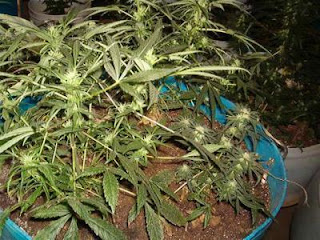
Joe Schwartz is a 90-year-old great-grandfather of three who enjoys a few puffs of pot each night before he crawls into bed in the Southern California retirement community he calls home.
The Second World War veteran smokes the drug to alleviate debilitating nausea and is one of about 150 senior citizens on this sprawling, 18,000-person gated campus who belongs to a thriving — and controversial — medical marijuana collective operating here, in the middle of one of the largest retirement communities in the United States.
The fledgling collective mirrors a nationwide trend as more and more senior citizens turn to marijuana, legal or not, to ease the aches and pains of aging. But in Laguna Woods Village, tucked in the heart of one of the most conservative and wealthiest counties in California, these ganja-smoking grandparents have stirred up a heated debate with their collective, attracting a crackdown from within the self-governed community.
Many members of the two-year-old collective keep a low profile, but others grow seedlings on their patios and set up workshops to show other seniors how to turn the marijuana leaves into tea, milk and a vapour that can be inhaled for relief from everything from chemotherapy-related nausea to multiple sclerosis to arthritis.
The most recent project involves getting collective members to plant 40 seeds from experimental varieties of marijuana that are high in a compound said to have anti-inflammatory properties best suited for elderly ailments. The tiny plastic vials, each containing 10 seeds, are stamped with names like "Sour Tsunami."
Under California law, people with a variety of conditions, from migraines to cancer, can get a medical marijuana card with a doctor’s recommendation and join a pot collective to get what they need. All the members of Laguna Woods Village’s collective have medical marijuana cards and are legal users under state law, but the drug is still banned under federal law.
Lonnie Painter, the collective’s president and perhaps most activist member, worries daily about his high-profile position within the tiny community of pot users. The 65-year-old grandfather supplements regular painkillers with marijuana tea for osteoarthritis and keeps stacks of marijuana collective applications on a desk in the living room, not far from the Lego bricks his seven-year-old grandson plays with on his frequent visits.
"We’ve got people who don’t like it here, they don’t like marijuana and they still have that ‘communism’ and ‘perversion’ and ‘killer weed’ attitude," said Painter, who has shoulder-length grey hair, a white goatee and wears several gold necklaces. "What I get more worried about is myself getting put in jail. If you were just a patient you’d be safe, but if you are active and involved in any way in making it available for others, the federal government can come and scoop you up."
In the first two years of the collective’s life, however, Painter and other members have had more trouble from their fellow residents than from the government.
When things first got under way, Painter and three others were growing about two dozen plants with names like Super Silver Haze in the Laguna Woods Village community garden.
Photos show his 77-square-metre plot overflowing with marijuana plants taller than a grown man butting up against the staked tomatoes and purple flowering clematis of other gardeners.
But the Golden Rain Foundation, the all-volunteer board that governs the community, cracked down and prohibited the cultivation of marijuana on all Laguna Woods Village property.
"We thought that it was not proper. It sets a precedent. Our gardens are for flowers and vegetables, and that’s all, and it’s been that way since 1964 or 1965 when this was started," said Howard Feichtmann, who was chairman of the Garden Advisory Group.
"We thought that’s what it should remain and not get involved with medical marijuana or anything else that is considered on the fringe."
Those with medical marijuana cards can still grow the state limit of six mature plants per person in their private residences.
Комментариев нет:
Отправить комментарий